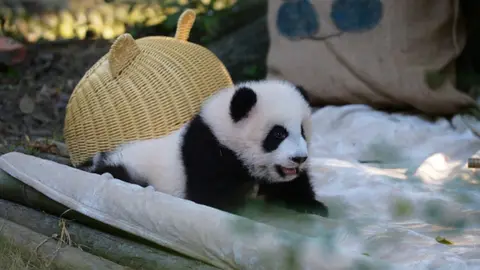Chinese 'panda' pet cafe raises eyebrows
 Hongxing News
Hongxing NewsAnimal cafes have been springing up all over the world for the last two decades as a place for animal lovers to enjoy a meal alongside their furry friends.
But a new "panda" cafe in Chengdu in south-western China - internationally known as the home of the giant panda - is raising eyebrows and a lot of concern.
According to the Chengdu Economic Daily, a cafe recently opened in Chengdu, seems at first glance to be home to six giant panda cubs.
But the "panda" cafe is - in fact - all bark and no bite because on closer inspection, it turns out they are actually the Chow Chow breed of dogs, which have been dyed to look like China's national animal.
'Could damage their fur and skin'
The owner of the cafe, Mr Huang, says that as well as serving food and drink, the cafe provides a dyeing service.
He tells Hongxing News that he imports his dye from Japan and has hired special staff for dyeing the dogs.
"Every time we dye it costs 1,500 yuan [$211; £163]," he says. "The dye is really expensive." He says that this is to ensure the quality of the dye, and says that it in no way affects the animals.
You may also be interested in:
Hongxing News says that a short video inside the cafe had raised awareness of it nationally and has boosted visitor figures.
But it has also raised a lot of concern. One vet, Li Daibing, told Hongxing News that he urged people not to dye their pets, saying: "This could damage their fur and skin."
 VCG
VCG'Has become normal'
Dyeing pets became a full-blown craze in China in the early 2010s, first for competitions, but then amidst a domestic wave of "extreme dog pampering".
Since, however, there has been a growing consciousness in China about animal ethics and testing. Many of the thousands of social media users commenting on the popular Sina Weibo microblog have voiced their concern about such treatments being used on animals.
Many call the idea "crazy" and note that hair dye can "damage people's hair and scalp", so could similarly affect a dog.
But others argue that "it's really cute", and say that they perceive animal dyeing "has become normal".
It's not just China either - earlier this year, the Latitude Festival in Suffolk was criticised by the RSPCA after a flock of sheep were dyed pink.
Reporting by Kerry Allen
Use #NewsfromElsewhere to stay up-to-date with our reports via Twitter.
